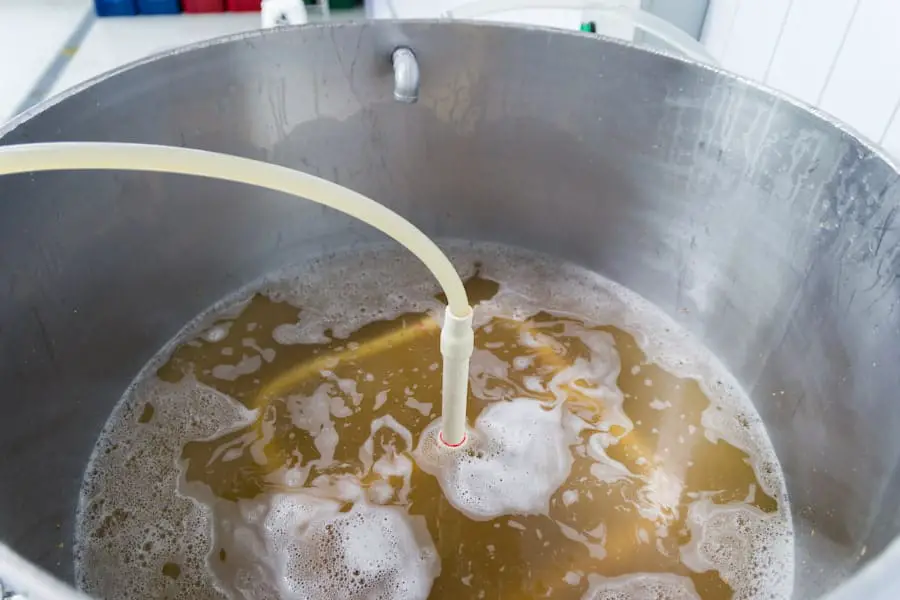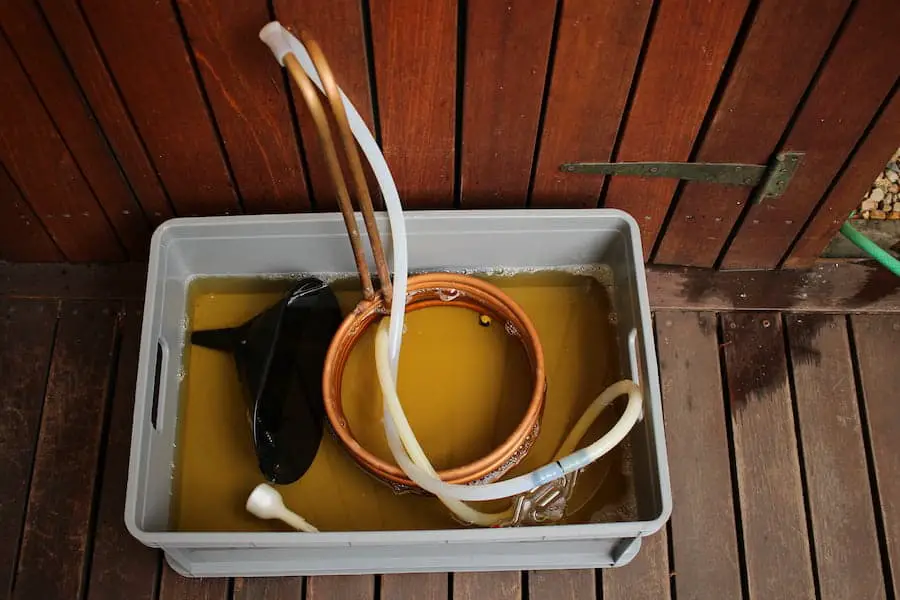If you buy something through a link in our posts, we may get a small share of the sale.
If you are a homebrewer and always stuck trying to decide between stainless steel vs. a copper wort chiller, relax! You are not alone. The two materials have their own unique benefits and drawbacks that make it difficult to choose the right one for your brewery and individual needs.
Contents
Stainless Steel vs Copper Wort Chiller General Overview
These two materials are the most popular for wort chillers for excellent reasons. Each has its own benefits. For instance, copper is easy to bend and can be formed into various shapes, making it easy for brewers to customize their chillers. Steel tends to be rigid and difficult to bend; however, it is less likely to corrode.

Copper has long been the preferred material for wort chillers until steel became more popular in the late 1990s. Early steel chillers had problems with galvanic corrosion, where two different types of metal (steel and copper) corrode when they are in contact with each other. However, recent advancements in stainless steel alloys have eliminated this problem.
Stainless Steel
Stainless steel is not as old as copper though it has been used for a variety of purposes. It is made from an alloy of iron and carbon. The addition of chromium makes the steel stainless, meaning it will not corrode in the presence of oxygen and water.
When it comes to brewing, it is a great option for brewers because of its inertness and non-reactivity. This means that it will not add any metallic flavors to your beer and will not corrode, providing long-term use.
Pros
- Corrosion-resistant – will not corrode over time, providing long-term use.
- Cleaning it is easy – a simple scrub with soap and water will do the trick.
- A gold standard in brewing – many pro brewers use stainless steel chillers for their high-quality beer.
Cons
- Its rigidity can make it difficult to maneuver – it can be tough to get the chiller into your brew pot’s tight spaces.
Copper
Copper has been used for centuries in various applications, including brewing. It is made from an alloy of copper and tin.
Copper is a popular choice when it comes to brewing because of its thermal conductivity. This means that it can quickly transfer heat from your wort to the chiller, ensuring that your beer is cooled quickly.
Pros
- Thermal conductivity – copper can quickly transfer heat from your wort to the chiller, ensuring that your beer is cooled quickly.
- A classic choice in brewing – many brewers swear by copper chillers for the superior quality of their beer.
- You can easily solder or weld copper fittings – this allows you to customize your chiller to fit your specific needs easily.
- Setting up a copper chiller is easy – all you need is a few basic tools, and you’re ready to go.
Cons
- Susceptible to corrosion – over time, copper can corrode and leach into your wort, adding undesirable flavors to your beer.
Comparing Stainless Steel and Copper
These two metals share some similarities and some differences. Here’s a side-by-side look at how they compare:

Similarities
- Both are made from alloys – Steel is made from an alloy of iron and carbon, while copper is made from an alloy of copper and tin.
- Both are corrosion-resistant – stainless steel will not corrode in the presence of oxygen and water, while copper is resistant to corrosion but can still corrode over time.
- Both conduct heat well – this is beneficial for quickly cooling your wort.
- Both aid in clarifying wort – by transferring heat quickly, both materials help remove unwanted proteins or solids from your wort.
Differences
- Copper is stronger than steel, making it a better option for those who plan to use their chiller regularly.
- Copper is heavier than steel, making it a bit more difficult to move around.
- Steel material is easier to use than copper, as it is less rigid and can more easily maneuver into tight spaces.
- Stainless steel is more durable than copper, as it is less likely to corrode over time.
- Copper is more difficult to clean than stainless steel, as it is not as easy to scrub clean.
When to Use Stainless Steel
The best time to use a steel chiller is when you are looking for a corrosion-resistant option that will not add any metallic flavors to your beer. If you are looking for an easy-to-use chiller that is durable and will not corrode over time, then it is the best option.
When to Use Copper
Copper is a great choice for quickly cooling your wort and removing unwanted proteins or solids from your beer. If you are looking for a chiller with superior thermal conductivity, or if you are looking to customize your chiller with solder or welded fittings, copper is the best option.
Which Is Better?
The better metal here is stainless steel. It is more durable and easy to use than copper, and it will not add any metallic flavors to your beer. If you are looking for a corrosion-resistant option that is easy to use, then stainless steel is the best choice.
Conclusion
Getting the best results from your home brewing requires the right equipment – and a wort chiller is a key piece of equipment. So, it is important to weigh the options and decide which chiller will work best.

